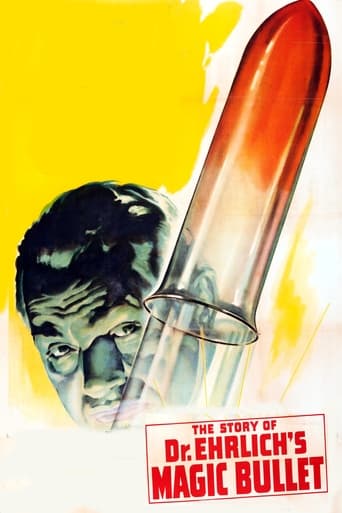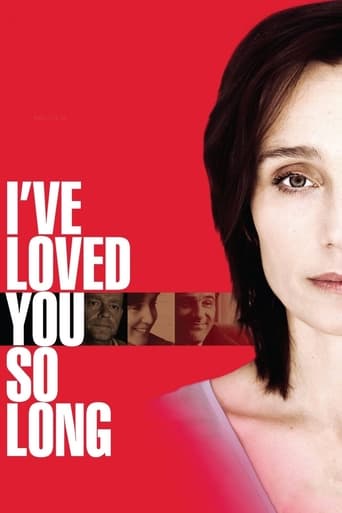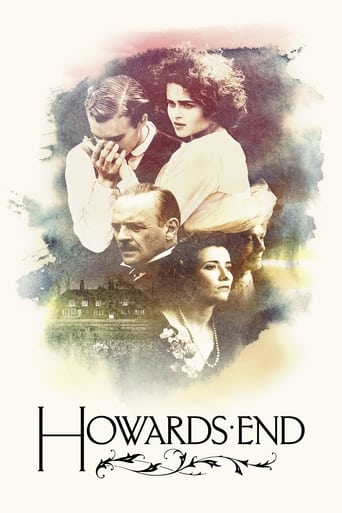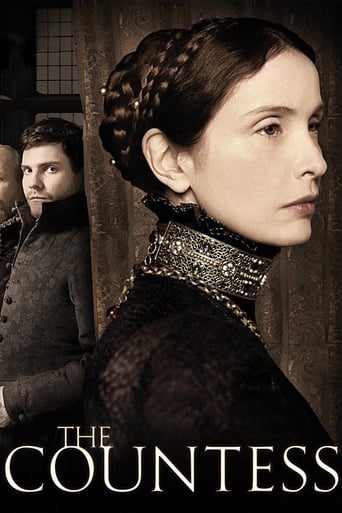


Dr. Ehrlich's Magic Bullet
True story of the doctor who considered it was not immoral to search for a drug that would cure syphillis.
-
- Cast:
- Edward G. Robinson , Ruth Gordon , Otto Kruger , Donald Crisp , Maria Ouspenskaya , Montagu Love , Sig Ruman


Similar titles










Reviews
Just perfect...
Good movie but grossly overrated
It's complicated... I really like the directing, acting and writing but, there are issues with the way it's shot that I just can't deny. As much as I love the storytelling and the fantastic performance but, there are also certain scenes that didn't need to exist.
It's entirely possible that sending the audience out feeling lousy was intentional
The thirties were a time when biopics were both common and popular. During this period they usually dealt with businessmen, politicians or scientists, all presented as industrious, inventive, heroic. Tyrone Power founded Lloyd's of London when he wasn't building the Suez Canal, for instance, Edward Arnold was Diamond Jim Brady, at least three actors were Abraham Lincoln, Edward G. Robinson founded Reuters and -- dare we say it? -- Orson Welles was William Randolph Hearst. Later they turned epic and their subjects broadened to include athletic icons, musicians, and artists, like "Lust for Life", and by the 60s they were far fewer but far truer. I'll mention "Lawrence of Arabia." In this 30s film, Robinson is Paul Ehrlich (1854 - 1915), a famous medical researcher whose curriculum vitae must run to dozens of pages covering dyes for microorganisms, the treatment of diphtheria, and finally the first cure for syphilis, called Salvarsan, which antedated the discovery of penicillin by years.These old biographies from the 30s are really enjoyable, even the Nazi propaganda film on Robert Koch, who practically founded bacteriology. Everything is slimmed down, gentrified, aimed at a working-class audience whose demands are low and who are satisfied with a cartoonish simplification of the subject's life. Ehrlich, for example, was responsible for the term "chemotherapy", mentioned only once because it has too many syllables, and for the "side chain theory" of immunization, mentioned once also but never explained. This particular film stands out for dealing openly with syphilis at a time when such things weren't referred to in polite company. Such social problems got the "Reefer Madness" treatment if they came up at all.Ehrlich has an argument mid-way through the film with his old friend and colleague Emil Behring. The conflict is obscure and the argument lasts about one minute before Behring deserts Ehrlich and leaves. Not until the end does Behring admit he'd been wrong -- and there is a tearful reconciliation. In historical reality, the two had cooperated in finding a treatment for diphtheria but Behring managed to sign the contract and make all the money, and took all the credit for the discovery. Adding insult to injury, Behring won the first Nobel Prize for Physiology or Medicine. (Ehrlich won the prize later.) But who cares? The disruption of their friendship and the reunion hug that followed is far more dramatically satisfying.William Dieterle was the director. He'd also directed "The Story of Louis Pasteur." (I'm telling you, there were a lot of biopics around.) Dieterle was a refugee from Nazi Germany and, in casting this film, he must have hired every German within a fifty mile radius of Hollywood. Even the secretary who blows her nose when Donald Meek pipes up was German. At least this cast guaranteed that the name "Ehrlich" is pronounced authentically -- it never comes out as "Erlick." Can I tack on another editorial comment? Throughout, we see Ehrlich and the others experimenting with mice and rabbits before trying their treatments out on human beings, including themselves. When you experiment on yourself it's called "self report," an established and accepted way of seeing what happens when one is exposed to an experimental substance. Sometimes it happens accidentally. In 1943, the Swiss chemist Albert Hoffman absorbed a minuscule amount of LSD through his fingertips and took the first acid trip. It kicked in while he was riding home on a bicycle. It must have been some bicycle ride.Sorry. Lost my train of thought while thinking about that bicycle. The point I wanted to make is that Ehrlich and the rest weren't really interested in mice and rabbits. They're just used because they're more convenient (and more legal) than human subjects. Some of us today are making the same mistake that the non-scientists in the movie make, complaining that too much money is spent on grants to study animals. But, again, the animals are just laboratory tools like scalpels. I don't know what geneticists would do without the fruit fly. Drosophila reproduce like crazy and make it possible to study patterns of inheritance without taking hundreds of years to do it.I should also add that when Ehrlich and Behring decide to treat ALL the children with diphtheria, not just half of them, it poses a neat question in biomedical ethics. It saved their bacon that every one of the twenty children recovered. If the results had been less definitive they'd have screwed up the experiment by eliminating the untreated children, called "the control group." But you don't always NEED a control group. If I can take ten monolingual English speakers and teach them to speak fluent French in two weeks, there's no need for controls. That, basically, is the kind of good luck that Erlich and Behring had in their diphtheria experiment.
I really love the old 1930s-40s Warner Brothers Biographical films and this is one of the best. Madame Curie, Emile Zola, Abraham Lincoln, Andrew Johnson, Mark Twain, Thomas Edison and others all come to life in these terrific, mostly black & white, films. Had this movie never been made I would never have heard of Dr. Paul Ehrlich, who led the way to find and defeat bacteria and micro-organisms. All of these geniuses had to overcome detractors who labelled them as quacks and lunatics. What gave them the gumption and tenacity to go on, even after failures? How did others trust them, support and finance them? Thank God for these people who fought to serve humanity. Edward G. Robinson is always good, but never more so as Dr. Ehrlich. A fine German-American supporting cast led by Otto Kruger, Sig Ruman and Albert Basserman add to the enjoyment as does a fine Max Steiner score. Director William Dieterle keeps the film moving along and it never gets slow or boring. The story starts with Ehrlich's discovery of staining slides so the bacteria and micro-organisms are better defined and diseases diagnosed, which leads to creation of vaccines. After finding a cure for diphtheria using inoculations, his colleagues still are skeptical and distrustful of him when he attempts to research man-made, chemical vaccines, which he calls "Magic Bullets". The film is so involving that I headed for Wikipedia to learn more about this fabulous genius. This is what movies do best!
Dr. Ehrlich's Magic Bullet (1940) *** 1/2 (out of 4) John Huston co-wrote the screenplay and won an Oscar for it for this bio-pic from Warner. Dr. Paul Ehrlich, played brilliantly by Edward G. Robinson, draws heat from his peers when he decides to try and find a cure for the morally incorrect syphilis. It's rather shocking to find out that Robinson never received an Oscar nomination and it's even more shocking after watching his brilliant work here, which is perhaps the greatest I've seen from him. He has to age several decades here but Robinson nails each stage of the doctor's life from his early days working in a hospital to his final days dealing with a trial over his syphilis serum. It's amazing to see how much Robinson transformed himself because he looks and acts unlike anything I've seen him in. He has a wig on, a strange beard and right from the start you see him as the doctor and not Robinson. There's no question the actor will always be remembered for his role in Little Caesar but his work here is so much better. The studio went all out and gave him a terrific group of supporting players including Otto Kruger, Ruth Gordon, Donald Crisp, Maria Ouspenskaya, Henry O'Neill and Donald Meek. The screenplay is very ambitious in that it tries to cover various aspects of Ehrlich's life and for the most part it works, although I thought that a few segments were rushed over so that the film could get onto other aspects of his life. The final trial didn't come off too well but it did make for a nice payoff through Robinson's touching final scene inside the courtroom.
Well made and accurate film illustrating the great efforts Dr. Ehrlich made in strict scientific method and his ability to comprehend disparate events. This culminated in Dr. Ehrlich's nearly single-handed development of cytology, histology, hematology, hypothesis of immunity and antitoxins and cure for syphilis. Illustrates what one determined individual willing to work may accomplish to the betterment of mankind. Paul Ehrlich was a dedicated physician and scientist of the first order. His efforts likely saved the lives of some of your ancestors if not you, yourself. I regret I can not afford to buy the movie, nor find it re-listed on the TV guide or movie listings. I would be happy to see it again, though it illustrates how little I have made of my life in comparison to that of Dr. Ehrlich.
